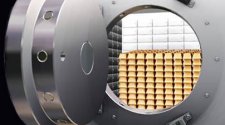

A precious metals depository is a third party storage facility where customers are able to store their precious metal bullion. Depositories are ideal for customers who have made significant investments in precious metals and who no longer have the capacity to store these large collections in their homes or on their property. Depositories are not only equipped to hold large amounts precious metals, but they have also been built to provide optimal protection for your valuable investments. While storage at a depository can be more expensive, it can spare customers from a lot of potential problems in the future.
Typically, when customers decide to store their valuables in a depository, they will be given the option of choosing between segregated and non-segregated storage. Precious metals kept in segregated storage will be separated from all other precious metals at the depository in a storage compartment reserved for private use. Items in non-segregated storage are held in a communal area along with other people’s bullion. Although some customers may feel more comfortable knowing that their valuables are tucked away in a separate compartment, both segregated and non-segregated storage provide an equally strong degree of protection.
The main reason customers turn to depositories for their storage needs is the lack of space in their own homes. While smaller collections of bullion can be easily concealed in a drawer or safe, customers have greater difficulty hiding larger quantities of precious metals. Attempting to do so can cause customers to lose track of all their hiding places or hide them in ways that could potentially damage the bullion. For these customers, depositories offer the ample storage required for their large collections as well as the necessary conditions for storing their metal, such as temperature and moisture control.
Another major benefit to using a depository is the protection that these highly guarded facilities can provide. Home-stored precious metals are only safe when they remain hidden or have someone watching over them. However, once someone finds the whereabouts of these valuables, nothing can stop them from being stolen. In comparison, depositories employ high level security both internally and externally to ensure the constant protection of the customer’s valuables.
Equally as significant as the protective measures offered by the depository are the regulation and compensatory services it provides its customers. For many depositories, the primary means of regulating the amount of precious metals they hold is through periodic reporting completed by their accounting and auditing departments. This documentation enables the depository to take stock of their entire inventory and assess whether everything is accounted for or if anything is missing. Not only do these sporadic audits make detecting theft and misplacement simple, but they also allow depositories to assure customers that their all precious metals assets are present and secure. Such financial transparency is essential in building the trust between both the investor and their depository.
While incidents of theft, loss and damage are very rare for a precious metals depository, nearly all of them offer some form of insurance to cover these occurrences. As with internal auditing, insurance is integral to developing the customer’s trust. It allows customers to rest easy knowing that they are covered by the depository’s insurance policies, and it helps reestablish trust should any of the aforementioned incidents occur. In most standard insurance policies, depositories are required to provide financial compensation for any harm that comes to their client’s assets while these items were stored within their facilities. Please be advised that certain insurance policies have restrictions regarding how much compensation a customer is entitled to, as well as how much of their precious metal is eligible for coverage, so it is vital for customers to discuss this with their depository prior to storage.
Undoubtedly, the most important advantage to depository storage is that it reduces the risk of any harm coming to the customers themselves. When customers keep their gold and silver at home, they jeopardize the safety of their investments and themselves by making themselves potential targets for theft and even armed burglary. Fortunately, by turning their valuables over to a third party facility that is equipped to handle such crimes, customers relieve themselves from the risks and responsibilities of having to guard their precious metals themselves.
Among the disadvantages of keeping precious metals in a depository are the maintenance expenses. Customers are required to pay depositories a storage fee for the use of their facilities. Moreover, customers who choose segregated storage over non-segregated will usually be charged higher rates. Additional fees may also be incurred by the removal or withdrawal of their precious metals from the depository.
Another disadvantage of depository storage is their limited access. Customers have to travel to the depository itself to check on their values and, very often, such establishments are located far from the customer’s home. In addition to the geographical obstacles, customers will only have access to their precious metals during the depository’s hours of operation, not including federal holidays. Such restrictions could cause challenges in the event of a financial emergency.